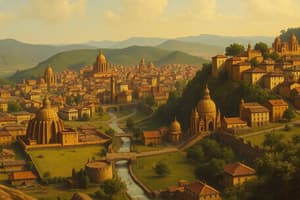Podcast
Questions and Answers
What was the primary basis of the economy in the Indus Valley Civilization?
What was the primary basis of the economy in the Indus Valley Civilization?
- Fishing and maritime trade
- Agriculture, crafts, trade, and animal husbandry (correct)
- Manufacturing and industrial production
- Mining and resource extraction
What was a key feature of the urban planning in the Indus Valley Civilization?
What was a key feature of the urban planning in the Indus Valley Civilization?
- Cities had no central planning or organization
- Cities were built around natural water sources like rivers
- Streets were laid out in a grid pattern (correct)
- Residential areas were intermingled with industrial zones
Which of the following was NOT a common motif in the art of the Indus Valley Civilization?
Which of the following was NOT a common motif in the art of the Indus Valley Civilization?
- Abstract human figures (correct)
- Swastikas
- Seated females
- Horned animals
What was a prominent art form in the Indus Valley Civilization?
What was a prominent art form in the Indus Valley Civilization?
What is known about the writing system of the Indus Valley Civilization?
What is known about the writing system of the Indus Valley Civilization?
What is the reason for the decline and disappearance of the Indus Valley Civilization?
What is the reason for the decline and disappearance of the Indus Valley Civilization?
Flashcards are hidden until you start studying
Study Notes
Urban Planning
The Indus Valley Civilization is known for its sophisticated urban planning. The cities were well planned with streets laid out in a grid pattern. Each city had a central bath and a large drainage system that carried waste water away from residential areas. The cities also had waste management systems. This carefully planned infrastructure allowed for efficient movement of people and goods within the city.
Trade and Economy
The Indus Valley Civilization was a major trading civilization with connections stretching from Mesopotamia in the west to Afghanistan in the east. They traded items like copper, gold, jewelry, pottery, semi-precious stones, ivory, and finished textiles. The economy was based on agriculture, crafts, trade, and animal husbandry.
Art and Culture
Indus Valley art reflects their daily life, religious beliefs, and occupation. Some common motifs include swastikas, horned animals, seated females, and a variety of geometric patterns. Pottery was one of the most prominent arts of this civilization, which included both plain red ware and black and red painted pottery. Their writing system has been discovered on seals, tablets, and pottery shards.
Decline and Disappearance
The decline of the Indus Valley Civilization remains a mystery. There are several theories suggesting natural climate change, migration, invasion by foreign tribes, or conflict between different groups. However, there is no conclusive evidence to support any single theory.
Writing System
The Indus Valley Civilization used a form of writing that has not been deciphered. The script is known as Indus script or Indus script system. It consists of short phrases or words that were written on clay tablets, seals, and pottery shards. The script has been found at numerous sites across the Indus Valley.
In conclusion, the Indus Valley Civilization was a highly advanced civilization known for its urban planning, trade, art, and culture. Despite its many achievements, the civilization's decline and disappearance remain a mystery.
Studying That Suits You
Use AI to generate personalized quizzes and flashcards to suit your learning preferences.




